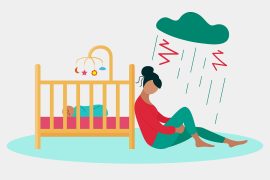Introduction
Experiencing vaginal bleeding after sex, commonly referred to as postcoital bleeding (PCB), can be both alarming and confusing. While PCB can occasionally relate to pregnancy, there are a myriad of other reasons that one should be aware of.
What Exactly is Postcoital Bleeding?
PCB is defined as bleeding that happens after sexual intercourse. It’s distinct from menstrual bleeding and other forms of abnormal bleeding emanating from the reproductive organs.
Why Do Some Experience Bleeding After Sex? Common Causes Explained
- Infections: A sexually transmitted infection (STI) like chlamydia or gonorrhea, or even pelvic inflammatory disease (PID), can trigger inflammation in the cervix, leading to bleeding.
- Cervical Polyps: These are benign growths on the cervix, which can bleed when touched.
- Cervical Ectropion: This condition, where cells from inside the cervical canal are found on the outer surface of the cervix, can be a source of the bleeding.
- Vaginal Dryness: Often linked to dropping estrogen levels, especially during menopause, this can cause the vaginal tissues to be more susceptible to tears.
- Trauma: A vaginal tear or other trauma can be caused by vigorous or rough sexual activity.
- Cancer Concerns: Cervical or vaginal cancer symptoms can include PCB. Regular pap smears are essential for early detection and prevention.
The Pregnancy Connection
- Implantation Bleeding: Some women might notice light spotting when a fertilized egg attaches to the uterus lining – a distinct occurrence from a regular menstrual cycle.
- Pregnancy Complications: PCB can sometimes signal complications in an ongoing pregnancy, such as a miscarriage or ectopic pregnancy.
Detecting the Cause of PCB
A healthcare provider will often start with a pap smear to detect any cellular changes in the cervix. Other diagnostic methods include pelvic exams and swab tests. The correct diagnosis is crucial as treatment varies based on the underlying cause.
Protecting Yourself and Preventative Measures
- Regular Health Checks: It’s crucial to get regular check-ups and pap smears, especially if you’ve ever experienced vaginal bleeding after sex.
- Stay Safe: Ensure you’re practicing safe sex to reduce the risk of STIs.
- Combatting Dryness: Using vaginal moisturizers or lubricants can help counter vaginal dryness, reducing the risk of irritation or tears.
Knowing When to Consult a Professional
While an occasional bleed after sex might not be urgent, symptoms like intense pain, heavy bleeding, or accompanying signs like fever could point to a more severe condition, necessitating immediate medical attention.
Beyond the Surface: Delving Deeper into Postcoital Bleeding
Further Understanding the Causes
- Hormonal Fluctuations: Birth control pills and other hormonal therapies might lead to changes in the vaginal tissues, making them more susceptible to bleeding.
- Vaginal Atrophy: This is thinning and drying of the vaginal walls, often due to reduced estrogen levels. It can lead to an increased risk of PCB.
- Underlying Health Conditions: Conditions like endometriosis or fibroids can make one more prone to postcoital bleeding.
Tackling the Myths
A prevalent myth is that postcoital bleeding is a ‘normal’ or ‘common’ symptom everyone experiences. While it’s not uncommon, it shouldn’t be brushed off. Addressing the root cause is essential.
Comprehensive Care: Treatment Options
- For Infections: If an STI or another infection is diagnosed, a course of antibiotics or antiviral medication might be prescribed.
- For Vaginal Dryness: Estrogen creams, vaginal moisturizers, or lubricants can be recommended to alleviate symptoms.
- For Polyps or Growths: A minor surgical procedure might be required to remove cervical polyps, ensuring they’re benign.
- For Hormonal Imbalance: Adjusting or switching birth control methods or hormone therapies can sometimes help.
Empowerment through Education
Awareness about one’s body can make a difference. Regular self-checks and understanding one’s menstrual cycle can help in identifying any abnormalities swiftly.
Prevention is Better Than Cure
- Regular Screenings: Regular pap smears and check-ups help in early detection of conditions like cervical cancer.
- Safe Intercourse: Using condoms can significantly reduce the risk of STIs, a common cause of PCB.
- Stay Hydrated: Keeping the body hydrated helps maintain mucosal moisture, including that in the vaginal tissues.
- Support and Community
For many, experiencing PCB can be distressing. Seeking support from communities or groups that offer a platform to share experiences and advice can be comforting. Remember, you’re not alone in this.
Holistic Approach to Postcoital Bleeding: Body, Mind, and Lifestyle
Holistic Understanding
When examining postcoital bleeding, a comprehensive approach that considers not only the physical but also emotional and lifestyle factors can offer deeper insights. This approach recognizes that our bodies are integrated systems, and a symptom in one area might have roots elsewhere.
Emotional and Psychological Aspects
- Stress: Chronic stress can impact hormonal balance and potentially influence vaginal health, including factors that might lead to PCB.
- Relationship Dynamics: Issues in a relationship can manifest physically. It’s essential to maintain open communication with your partner about any discomfort or concerns.
- Traumatic Experiences: Past traumatic experiences can have lasting impacts on physical health. If PCB is triggering distressing memories or feelings, seeking therapeutic support is crucial.
Lifestyle Considerations
- Diet and Hydration: A well-balanced diet can support overall reproductive health. Ensure you consume foods rich in omega-3s, antioxidants, and essential vitamins. Adequate water intake supports mucosal linings, including vaginal tissues.
- Physical Activity: Regular exercise boosts circulation and can help maintain hormonal balance, which might indirectly influence factors leading to PCB.
- Avoid Irritants: Certain products, like douches or fragrant soaps, can irritate the vaginal area, increasing susceptibility to PCB. Opt for natural, unscented products for intimate hygiene.
Alternative Therapies
- Acupuncture: Some believe that acupuncture can help balance the body’s energy and might provide relief from certain symptoms associated with PCB.
- Herbal Remedies: Plants like black cohosh or evening primrose oil are sometimes suggested for reproductive health. Always consult with a healthcare provider before starting any herbal treatments.
Building Resilience and Advocacy
- Education: Stay informed about the latest research and findings related to reproductive health and PCB.
- Community: Joining support groups or online forums can offer insights from others who’ve had similar experiences.
- Advocacy: By sharing your story and knowledge, you can help raise awareness and support others.
Treatment for Postcoital Bleeding (PCB)
Diagnosis:
- Medical history and physical examination.
- Pap smear tests and pelvic exams.
Infections:
- Prescribe antibiotics or antiviral medications.
Vaginal Dryness:
- Use estrogen creams.
- Recommend vaginal moisturizers and water-based lubricants.
Cervical Polyps:
- Remove via minor surgical procedures.
Cervical Ectropion:
- Treat with cauterization or cryotherapy.
Trauma:
- Advise rest and abstaining from intercourse.
- Topical treatments as needed.
Cancer Concerns:
- Biopsy for suspicious growths.
- Refer to specialist if confirmed.
Hormonal Treatments:
- Review and adjust birth control or hormone therapy.
Alternative Therapies:
- Consider acupuncture.
- Discuss herbal remedies.
Lifestyle Recommendations:
- Stay hydrated.
- Avoid vaginal irritants.
Conclusion
Postcoital bleeding is a common symptom that many encounter. Recognizing its causes, from changes in estrogen levels to cervical ectropion, and understanding when to seek help is essential. Always prioritize open communication with healthcare providers about any concerns.






